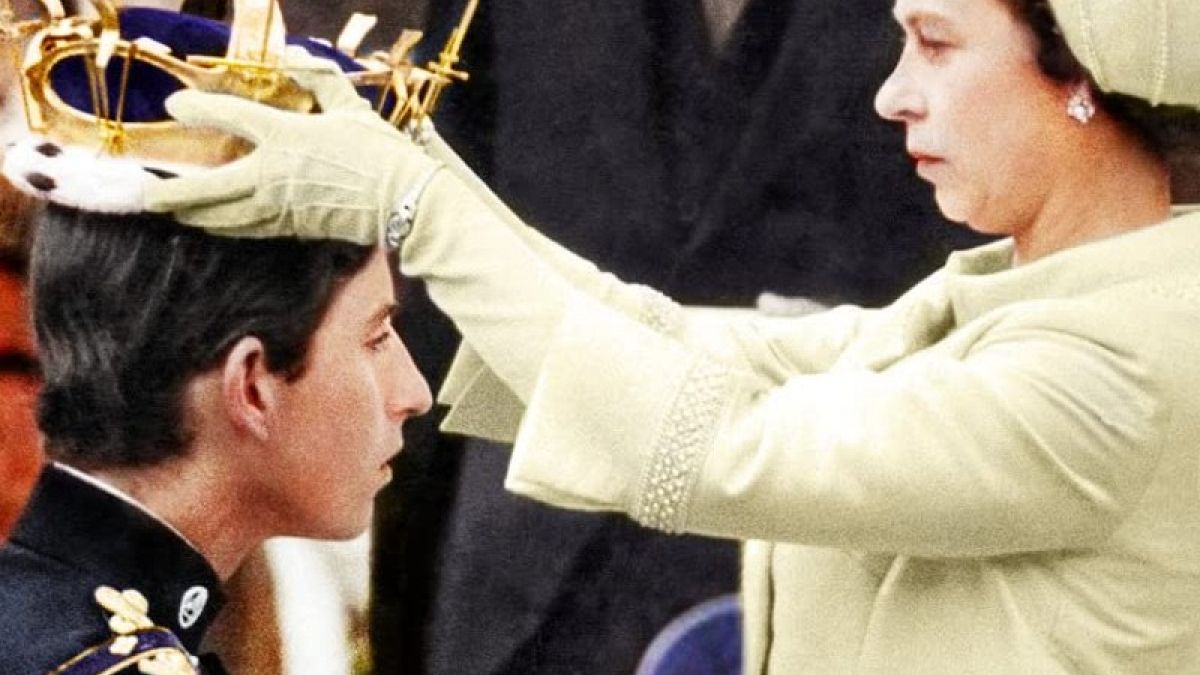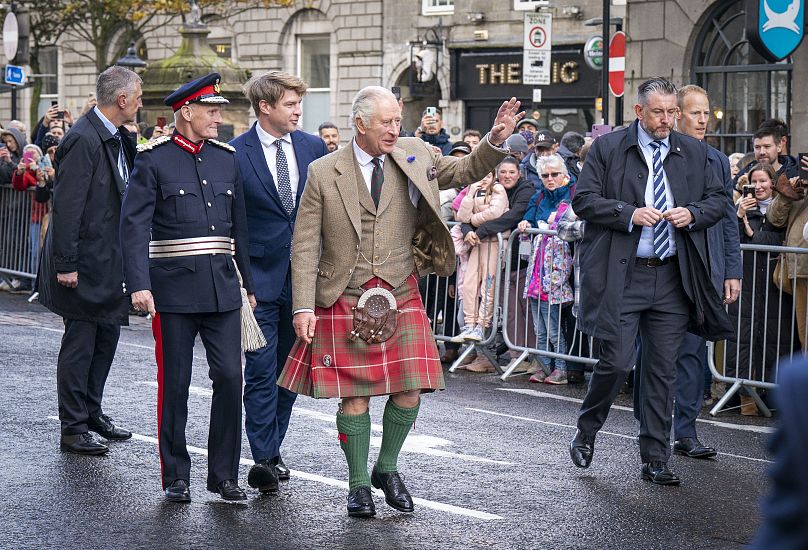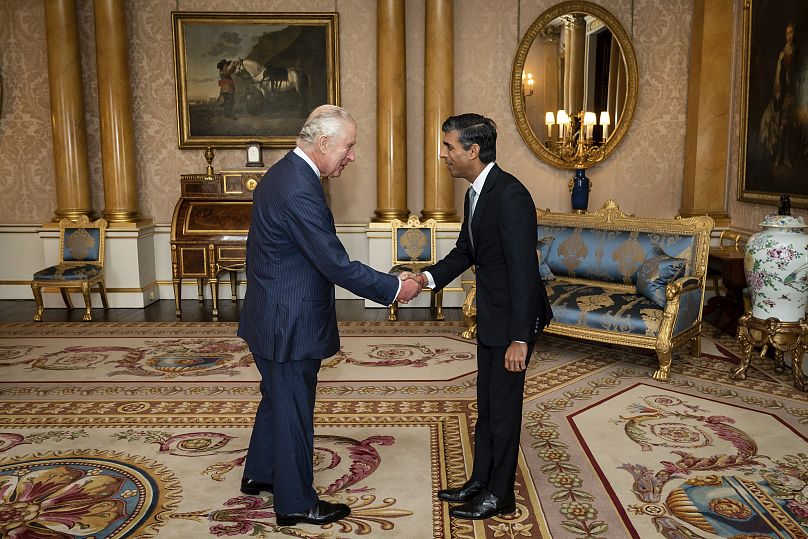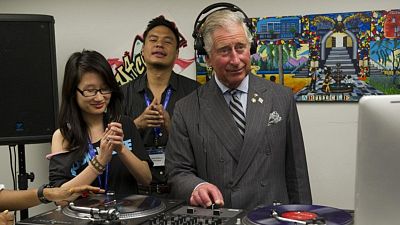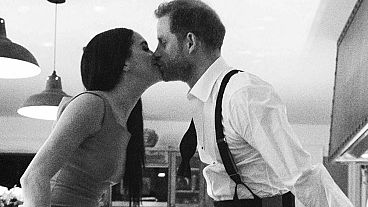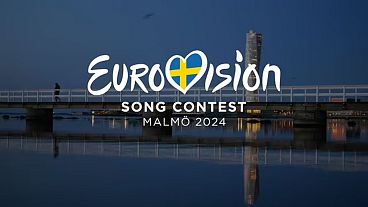Entente Cordiale: British-French writer Philip Kyle sat down with Euronews Culture to discuss his new book ‘Charles III’, the first French biography of the monarch.
Charles III of England will be crowned King on 6 May 2023.
But who is the 73-year-old man who comes to the throne less than two months after the death of his mother, Queen Elizabeth II?
British-French writer Philip Kyle provides answers in his soberly titled book ‘Charles III’, the first French biography of the monarch.
The author spoke with Euronews Culture about the challenges that lay ahead for the former Prince of Wales, the upcoming season of The Crown, and what role the monarchy still has in a country facing some of its most turbulent times.
Euronews Culture: Why did you choose to profile Charles, and have you always been interested in the monarchy?
Philip Kyle: The reason I wanted to write about the new king is because I worked for his foundation, The Prince’s Trust, which was created in 1976 and that has helped over a million young people since. And while I didn’t work directly with him, I was a member of the press team and often saw him at events. The Trust is heavily influenced by his thoughts. He is – I should say, he was, as I don’t know what it is today – involved in everyday decisions.
And being half French and half British, I had noticed that people in France know Charles mainly through his private life, and I thought it was a shame that people didn’t know all the incredible things that the new king has done in over half a century since he was crowned Prince of Wales.
How do you explain that the French, as well as many others, don’t know this side to Charles, and do you think there is an appetite to know more?
There is an appetite, especially now since he has become king. I live in France and in conversations with my friends, I realised that they are interested but didn’t know much about him. It’s revealing because it shows you what the king’s life has been up until now. He has always been in the shadows. In the shadow of his mother, an incredible monarch; of his father, a very great character; and then he was in the shadow of his first wife, Diana Princess of Wales, who had incredible charisma. The press were, at times, much more interested in her than in him.
And obviously in later years, he has been in some respects in the shadows of his sons, who are also immensely popular. I think that the media have unfairly focused mainly on these people and probably have not been interested enough in who he is, and especially what he has achieved.
There are challenges ahead for the new monarch, whether it’s the family, Harry releasing his autobiography next year… What we can expect from the Carolean age and the trials ahead?
I think it’s important to say that the monarchy rests today more than ever on keeping its popularity. The king is acutely aware of that, so this will be a challenge. You’re right to mention the family – I think the beginning of this new reign will be marked by one big challenge, which is keeping the unity.
The unity of the family, first of all – you mentioned that Harry is going to be publishing his autobiography in January, and we don’t know what’s going to be in there, so we can’t presume what he will say. But obviously questions are being asked.
Another challenge of unity, and probably more importantly, is the unity of the United Kingdom itself, given there are still many people who wish for an independent Scotland. Interestingly, and probably for the only time in her reign, Queen Elizabeth II in 1977 during her Silver Jubilee delivered an impassioned speech in which she crossed a little bit that line into being political, because she strongly advocated for the United Kingdom to stay united. So that is also something that Charles will be involved, directly or indirectly, in his conversations with the prime minister and the government.
There have also been talks of countries wanting to leave the Commonwealth following the death of Queen Elizabeth II – could this be the king that loses the Commonwealth?
I think the most pressing issue is the unity of the Commonwealth. We need to remember that Charles is not only the king of the United Kingdom but he’s also the king of 14 other states and the head of the Commonwealth, which is 56 countries. We have seen and heard in recent days and weeks voices starting to call for an end of the British monarch as the head of state. This is why I think that unity is the main challenge for the beginning of his reign.
Queen Elizabeth II was, by and large, a very popular monarch. Do you see Charles as someone who can retain that same sort of charisma and popularity? He hasn’t always been the most celebrated figure in the royal family in the eyes of the British public…
I think he has earned the respect and trust of the British people and it’s a blessing for him that he became king at such a late age. He’ll be 74 next month, and something that’s quite striking - and not many people have talked about it - is that Camilla has become queen at his side. I get the feeling that the British public have welcomed her. I have not heard of anyone who says that she should not be queen. She has also earned the trust and respect of the British people.
You must remember also that Charles has a different personality to his mother. His mother was immensely respected. She kept the stability, which is the root of what the crown represents. But she was shyer than Charles and less open to showing her emotions. And Charles is someone who’s quite emotional. He’s an empath, he’s able to relate. When I worked for him at The Prince’s Trust, for example, I saw him talking to young people from very difficult backgrounds and who had very difficult starts to life. And the way he interreacted with them and cared about them never failed to amaze me, given that he was born into such privilege and such wealth.
And if you look at the images of him touring the United Kingdom after his mother’s death – obviously people were grieving for the late monarch and were passing on their condolences – but I felt there was tremendous warmth from the public. He was very warm himself in the way that he interacted with them. And that’s something that the British people probably don’t necessarily realise yet but will grow to really value.
Charles has also been very outspoken in the past about his passions, like sustainable farming and the environment, and even with regards to his feelings towards certain PMs, like Margaret Thatcher or Tony Blair. Will that no longer be the case now that he’s king, or will his reign signal a new iteration of a more outspoken monarchy?
It’s a very good question and only time will tell. He has very clearly indicated that he knows what he constitutional role is as monarch, and that he knows the role of Prince of Wales is not the same as the role of the monarch.
When one is Prince of Wales, one can be a bit freer to express what one believes to be right. And yes, he has been outspoken and has even been provocative at some points. I think he used provocation to make his points. But I think that now that he’s the monarch, he is entering a new phase of his life and that he will obviously have to be more reserved on some of the issues that he advocated for in the past.
One recent example that was talked about a lot in the UK is that he was invited to go to COP27 next month to give a speech. I am pretty certain that he really wanted to go, given that we know he is an impassioned advocate for the fight against climate change. But Liz Truss asked him not to go. He apparently graciously took her advice, but I think he was hugely disappointed on a personal level, given that that would have been his first overseas visit. And what a symbol that would have been.
That said, he now has a new privilege as the monarch which is that he gets to meet with the prime minister once a week. We saw that when he welcomed Rishi Sunak earlier this week, they spent 40 minutes together, which is quite a long time. Queen Elizabeth usually spent about 15 minutes with her prime ministers. Obviously these meetings are secret, but one can imagine that this will be a really good time for him to voice any opinions that he might have on the issues of the day.
Speaking of the issues of the day, the United Kingdom is not in the best place right now, with record inflation, the cost of living crisis and a depressing revolving door of prime ministers. Many are wondering, given the circumstances, what the relevance and point is of what could be considered an outdated institution that needs to be relegated to the past.
It’s a question of opinion. Personally, I believe that the monarchy is more than ever essential when there are crises, because the main function of the monarchy is to keep the unity of the country and be above politics.
As you say, the United Kingdom is currently going through mainly an economic crisis and the polls are not good at the moment for the conservative party, so one can imagine that a lot of people in Britain are not in tune with this prime minister. Therefore I want to flip the argument and say that now, more than ever, people need a figurehead who is stable and who they can trust and who is reassuring. We remember how vital King George VI was during the Second World War and even more recently with the unifying and reassuring role of Queen Elizabeth at the beginning of the COVID pandemic. These are the moments when we see how valuable the monarchy is.
That said, I think that King Charles is very in tune with the public mood – he always has been. He has plans for a slimmed down monarchy, and this has been his idea for nearly 30 years. There are talks at the moment about reforming the way in which the councilors of state, who step in for the king when he is abroad, are appointed. It was a question that arose this week in the House of Lords whether Prince Harry and Prince Andrew, who are not working royals today and currently councilors of state, should still remain in that function. The idea that is being floated is that they would remain, but that more would be added. Which is in contrast with what Charles has always advocated for, this slimmed down monarchy. There’s a question mark over that one.
But Charles definitely wants to open the royal palace more for the people, and I think that’s something that’s very in tune with the public. Because the people are paying in some way for the upkeep of these palaces. So it’s only normal that they’re able to enjoy them. That’s what he has understood and is trying to do.
Laslty, there’s been a lot of criticism surrounding the Netflix series The Crown, and there are fears regarding the upcoming season which will depict some turbulent times in Charles’ life, including his divorce from Princess Diana and her death. Do you think that the chat surrounding the series is justified, and are you surprised that some people remain angry about a fictional retelling of several chapters of the British monarchy?
It doesn’t surprise me. The Crown is immensely popular, and a lot of people base their knowledge of recent history of the monarchy on The Crown. So, I think that the demands that have been made for there to be an insert at the beginning saying that it’s fictional are perfectly reasonable. It’s important for people to realise that when they switch on the series that they are aware it’s a work of fiction.
Do you think it could be harmful to the monarchy in any way?
It hasn’t been so far, but I have not seen the new series, so I can’t comment on that. Hopefully people will be able to know that it’s fiction and seek out what the real facts are. They can read my book for that!
Philip Kyle’s book ‘Charles III’ is out now. Check out the video above for extracts of the interview.
